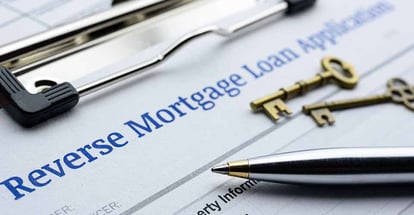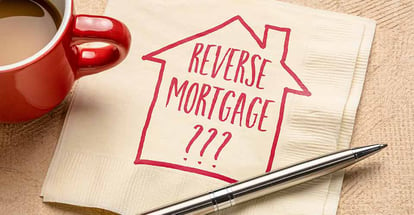Reverse mortgage: What it is and how it works in Florida
As Florida's population faces the challenge of rising inflation, many are exploring options to supplement their monthly Social Security payments, which average a meager $1,542.22 in 2022. For those looking to stay in their homes and maintain their standard of living, a reverse mortgage can be a valuable tool to acquire essential funds.
To better understand reverse mortgages and their implications, here is a comprehensive guide for homeowners contemplating this option.
Table of Contents
- What is a reverse mortgage?
- How does a reverse mortgage work?
- What can a reverse mortgage be used for?
- Reverse mortgage requirements
- Types of reverse mortgages
- Reverse mortgage pros and cons
- How much does a reverse mortgage cost?
- Is a reverse mortgage right for you?
- Alternatives to a reverse mortgage
- How to avoid reverse mortgage scams
- Bottom line
What is a reverse mortgage?
With a reverse mortgage, homeowners who are at least 62 years old and have usually cleared their mortgage can access a portion of their home's equity as income without incurring any taxes.
In contrast to a conventional mortgage, where the borrower makes payments to the lender, the lender disburses payments to the homeowner in a reverse mortgage arrangement.
Homeowners who choose this form of mortgage are not required to make monthly payments and can retain ownership of their home (i.e., continue to reside in it).
However, the loan must be paid back upon the borrower's death, permanent relocation, or sale of the property. The Home Equity Conversion Mortgage (HECM), backed by the federal government, is among the most prevalent reverse mortgage types.
How does a reverse mortgage work?
Even though the reverse mortgage principle may sound straightforward, eligible homeowners may not be able to borrow the entire value of their home, even if they have paid off the mortgage.
The amount of money that a homeowner can borrow, referred to as the principal limit, is dependent on the age of the youngest borrower or eligible non-borrowing spouse, current interest rates, the value of the home, and the HECM mortgage limit ($970,800 in 2022).
The principal limit generally increases with the borrower's age, the higher the property value, and the lower the interest rate. Borrowers with a variable-rate HECM may see their loan amount increase. Options for a variable rate include:
-
Equal monthly payments, provided that one borrower lives in the home as their primary residence.
-
Equal monthly payments for a fixed period of time predetermined.
-
A line of credit that can be utilized until it is exhausted.
-
A combination of a line of credit and fixed monthly payments for as long as you reside in the home.
- A combination of a line of credit and fixed monthly payments for a predetermined length of time.
If you choose a HECM with a fixed interest rate, however, you will receive a one-time, lump-sum payment.
Interest on a reverse mortgage accrues every month, and homeowners must still have sufficient income to cover property taxes, homeowners insurance, and home maintenance expenses.
What can a reverse mortgage be used for?
Reverse mortgage proceeds can serve as a valuable financial tool for homeowners, enabling them to supplement retirement income, cover the cost of necessary home repairs, or pay for out-of-pocket medical expenses.
This financial assistance is especially beneficial for seniors who lack sufficient savings or income to manage expenses, as it prevents them from resorting to high-interest loans or credit lines.
Moreover, reverse mortgages can provide seniors with a means of achieving financial stability during their retirement years.
The additional income obtained through reverse mortgage funds can help cover day-to-day expenses, ensure a comfortable lifestyle, and provide peace of mind, knowing that they have financial security.
Reverse mortgage requirements
Reverse mortgages are available to homeowners who meet specific eligibility requirements. The primary homeowner must be at least 62 years old, and the property must be used as the primary residence.
Other key eligibility requirements include owning the property outright or having a significant amount of mortgage paid off.
Additionally, the homeowner must not be delinquent on any federal debt and must have the financial capability to continue to pay for property taxes, homeowners insurance, and any homeowners association dues.
In addition to meeting these requirements, prospective reverse mortgage borrowers must also participate in an information session provided by a U.S. Department of Housing and Urban Development (HUD)-approved reverse mortgage counselor.
This information session is designed to ensure that borrowers fully understand the terms and conditions of the loan, as well as any risks and benefits.
By budgeting carefully, borrowers can avoid running out of funds too soon and ensure that they can continue to make payments on property taxes and insurance as agreed.
Ultimately, reverse mortgages can be a valuable tool for eligible homeowners seeking to supplement their retirement income and maintain their financial independence.
Types of reverse mortgages
Reverse mortgages are available in different types, each catering to specific financial requirements. Here are the three main types of reverse mortgages:
-
Home Equity Conversion Mortgage (HECM) - This is the most commonly used type of reverse mortgage, which is backed by the federal government. Although these mortgages have higher upfront costs, the funds can be utilized for any purpose.
Borrowers can choose how to withdraw the funds, such as through fixed monthly payments or a line of credit, or even both simultaneously. However, only FHA-approved lenders offer HECMs, and before closing, all borrowers must receive counseling approved by the U.S. Department of Housing and Urban Development (HUD).
-
Proprietary reverse mortgage - This type of reverse mortgage is a private loan that is not government-backed. Borrowers can typically receive a larger loan advance from this type of mortgage, particularly if they have a higher-valued home.
- Single-purpose reverse mortgage - Nonprofit organizations and state and local government agencies typically offer this type of reverse mortgage, which is not as common as the other two. Single-purpose mortgages are generally the least expensive of the three options, but borrowers can only utilize the loan for one specific purpose, such as a handicap-accessible remodel.

Reverse mortgage pros and cons
A reverse mortgage can be an attractive option for those who want to access cash from their home equity for daily expenses. However, borrowers should be aware of the fees involved. Here are some of the potential advantages and disadvantages of a reverse mortgage.
Pros of a reverse mortgage include:
-
No monthly payments required - Unlike a traditional mortgage, borrowers are not required to make monthly payments toward their loan balance. This can be especially helpful for seniors on fixed incomes who may struggle to meet regular payment requirements.
-
Flexibility of funds - Reverse mortgage proceeds can be used for a variety of purposes, including living and healthcare expenses, debt repayment, and other bills. This can provide financial relief and help seniors enjoy their retirement.
-
Non-borrowing spouse protections - If a non-borrowing spouse is not listed on the mortgage, they can still remain in the home after the borrower dies. This can provide peace of mind for couples and protect against the risk of displacement.
-
Foreclosure prevention - For seniors facing foreclosure, a reverse mortgage can be used to pay off the existing mortgage, potentially stopping the foreclosure process and allowing them to remain in their home.
- Tax-free income - Reverse mortgage proceeds are typically tax-free, which can be another benefit for borrowers looking to supplement their retirement income.
Cons of a reverse mortgage include:
-
The borrower must continue to maintain the property and pay property taxes and homeowners insurance.
-
Borrowing against the equity in your home with a reverse mortgage reduces the amount of equity that you can leave to heirs, potentially impacting their inheritance.
- Fees and closing costs associated with a reverse mortgage can be high, including mortgage insurance premiums and origination and servicing fees, which can lower the amount of cash available to the borrower.
How much does a reverse mortgage cost?
Closing costs for a reverse mortgage are not inexpensive, and most HECM mortgages allow homeowners to roll the costs into the loan so that they do not have to pay the money upfront. However, doing so will reduce the amount of funds available to you through the loan.
Here is a breakdown of the fees and charges for HECM, according to HUD:
-
Mortgage insurance premiums (MIP) - There is a 2% initial MIP at closing, as well as an annual MIP equal to 0.5% of the outstanding loan balance. The MIP can be financed into the loan.
-
Origination fee - To process your HECM loan, lenders charge the greater of $2,500 or 2% of the first $200,000 of your home’s value, plus 1% of the amount over $200,000. The fee is capped at $6,000.
-
Servicing fees - Lenders can charge a monthly fee to maintain and monitor your HECM for the life of the loan. Monthly servicing fees cannot exceed $30 for loans with a fixed rate or an annually adjusting rate, or $35 if the rate adjusts monthly.
- Third-party fees - Third parties may charge their own fees, such as for the appraisal and home inspection, a credit check, title search and title insurance, or a recording fee.
It is essential to keep in mind that the interest rate for reverse mortgages is typically higher, which can also add to your costs. Rates can vary depending on the lender, your credit score, and other factors.
Is a reverse mortgage right for you?
A reverse mortgage can be a valuable option for homeowners looking to supplement their retirement income. These funds can be used to cover medical expenses, in-home care, home improvements, or to supplement other sources of income, according to experts.
The flexibility of a reverse mortgage allows for different ways to receive payments, including a lump sum, monthly payments, a line of credit, or a combination.
Additionally, if the value of the home appreciates and is worth more than the reverse mortgage loan balance, the borrower or their heirs may receive the difference.
However, it's important to note that the opposite scenario can be problematic. If the balance owed on the loan exceeds the value of the home, the borrower's heirs may have to relinquish ownership of the property to the lender.
There may also be complications if others live in the home with the borrower. In such cases, it's essential for family members who inherit the property to understand the details of managing the loan balance when the borrower passes away.
Alternatives to a reverse mortgage
If a reverse mortgage doesn't appeal to you, there are other options to consider. One such option is a home equity loan or a HELOC, which allow you to borrow against the equity in your home.
Keep in mind, however, that lenders typically limit the amount to 80 percent to 85 percent of your home's value, and with a home equity loan, you'll have to make monthly payments. With a HELOC, payments are required once the draw period on the line of credit expires.
Another advantage of choosing a home equity loan or a HELOC is that the closing costs and interest rates tend to be lower than those associated with a reverse mortgage.
Alternatively, you could cut expenses to stay in your home long-term. Trimming discretionary expenses can help, but if you need help with a necessary bill, consider contacting a local assistance organization.
These organizations may be able to assist with fuel payments, utility bills, and home repairs. The Administration for Community Living can help you find one in your area.
Downsizing is another option to consider. If you're able and willing to move, selling your home and moving to a smaller, less expensive one can give you access to your existing home's equity. You can use the proceeds of the sale to pay for another house in cash or pay off other debt.
Refinancing is also worth exploring, especially if you haven't paid off your mortgage yet. Refinancing the loan could lower your monthly payments and free up the difference.
Be sure to weigh the closing costs and the new loan terms, however, to see how these will affect your finances in your retirement years.
How to avoid reverse mortgage scams
While exploring your options and searching for a suitable reverse mortgage, it's important to be aware of common scams that may occur. Two prevalent reverse mortgage scams to watch out for are contractor “loans” and veteran “loans.”
Contractors may try to persuade you to take out a reverse mortgage by offering home improvement services. Similarly, advertisements may falsely claim that veterans are eligible for fee-free reverse mortgages, despite the U.S. Department of Veterans Affairs (VA) not offering such services.
To protect yourself from these scams, it's essential to be vigilant and cautious. If an individual or company is pushing you to sign a contract or making unrealistic promises, it's a major red flag. Stay alert and do your research to ensure that you don't fall prey to these scams.
Bottom line
A reverse mortgage can be a helpful option for seniors who need to supplement their retirement income or pay for necessary expenses. However, it's important to carefully consider the terms and potential drawbacks before committing to a reverse mortgage.
Other options, such as downsizing, cutting expenses, or obtaining a home equity loan, may be more suitable for some individuals.
When shopping for a reverse mortgage, be aware of common scams such as contractor "loans" or offers targeted at veterans that promise special deals. Always do your research and don't let anyone pressure you into signing a contract.
Ultimately, a reverse mortgage can be a valuable tool for those who use it wisely, but it's not a one-size-fits-all solution. Seniors should carefully weigh the benefits and risks and consult with a financial advisor before making a decision.
With over 50 years of mortgage industry experience, we are here to help you achieve the American dream of owning a home. We strive to provide the best education before, during, and after you buy a home. Our advice is based on experience with Phil Ganz and Team closing over One billion dollars and helping countless families.

About Author - Phil Ganz
Phil Ganz has over 20+ years of experience in the residential financing space. With over a billion dollars of funded loans, Phil helps homebuyers configure the perfect mortgage plan. Whether it's your first home, a complex multiple-property purchase, or anything in between, Phil has the experience to help you achieve your goals.


 By
By  Edited by
Edited by 






